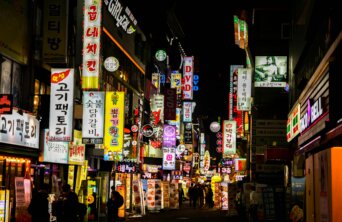- About
- Topics
- Picks
- Audio
- Story
- In-Depth
- Opinion
- News
- Donate
- Signup for our newsletterOur Editors' Best Picks.Send
Read, Debate: Engage.
| topic: | Democracy |
|---|---|
| located: | Korea, South |
| editor: | Chermaine Lee |
Can the world endure more war in the wake of killings in the Middle East and Ukraine, compounded by starvation in Sudan, Yemen, and beyond?
To many South Korean residents, the answer is a firm no, as became clear in their response to hardliner President Yoon Suk Yeol's declaration of martial law on 3 December. Despite public upheaval, on 6 December, he ordered the arrest of a list of opposition voices, including Han Dong-hoon, the head of his ruling party, who had suggested his party’s stance was shifting in favour of impeachment.
Soldiers enclosing the parliament after the order enraged the public and politicians alike. Yoon, who vowed to wipe out “pro-North Korean forces” and opposition voices, could not stop lawmakers from entering the building to vote against the martial law that many considered abhorrent.
Even the military hesitated to take the order: The army warfare commander told the media that he defied it because “dragging lawmakers out was an illegal act.”
Despite the East Asian nation’s young democracy, its citizens’ lack of tolerance for authoritarian leaders runs deep. This could stem from South Koreans’ frustrations with international observers and analysts who frequently compare Seoul’s democratic government to the dictatorship in communist North Korea, where the Kim family’s rule has fostered generations of corruption, poverty, and starvation among its citizens.
Although Yoon mentioned Seoul’s longtime antagonism with North Korea to explain his abrupt decision, many believe it was a scapegoat, that what he truly sought was to crush dissent in South Korea.
It is the latest event in a string of erratic leaders’ attempts to unite their supporters by framing opponents as national threats, like US President-elect Donald Trump accusing Mexico, Canada and China of drug trafficking to raise import tariffs; or Russian leader Vladimir Putin’s justifying his unsuccessful attack on Ukraine as a move against “Western-backed neo-Nazi danger”.
Such leaders often share a habit of promising to save their people from various “threats.” Yoon, for example, tapped into South Korean men’s confusion and insecurities in an era of growing female employment and economic standing by declaring himself “anti-feminist.” He claimed women did not suffer any discrimination and moved to abolish the ministry for gender equality and family. In the Americas, Trump and Argentinian President Javier Milei vowed to boost the economy amid global inflation and leveraged voter anxiety over needed lifestyle changes by denying the climate crisis.
In the wake of an information war further complicated by the use of AI this election year, a critical question emerges: What are the democratic parties not addressing that is enabling the rise of erratic conservative leaders like Yoon? Whether or not he faces impeachment, this question remains vital for nations grappling with political crises.
Image by Pixabay.
